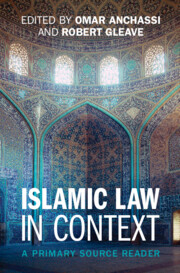Book contents
- Islamic Law in Context
- Islamic Law in Context
- Copyright page
- Contents
- Acknowledgements
- Contributors
- Introduction
- Part I Islamic Legal Theory (Uṣūl al-Fiqh) and Related Genres
- Part II Islamic Jurisprudence (Fiqh) and Related Genres
- Part III Legal Opinions (Fatwās)
- Chapter 17 Introduction to Part III
- Chapter 18 Ottoman Fatwās on the Substitution of Defunct Endowment Properties, from al-Aqwāl al-Marḍiyya of Qāḍīzādah Muḥammad Ṭāhir (d. 1254/1834)
- Chapter 19 Settling Disputes among Nomads
- Chapter 20 Fatwās on Aspects of Modern Life
- Chapter 21 ‘According to the Qaul Muʿtamad it is Unlawful and Invalid’
- Chapter 22 An Online Fatwā from the Dār al-Iftāʾ al-Miṣriyya on Women’s Leadership
- Chapter 23 ‘His Doctrine is Deviant’
- Part IV Court Judgments and Other Court Documentation
- Part V Judicial Manuals and Reference Books
- Part VI Alternative Sources for Islamic Legal Studies
- Name Index
- Subject Index
- References
Chapter 17 - Introduction to Part III
from Part III - Legal Opinions (Fatwās)
Published online by Cambridge University Press: 14 November 2024
- Islamic Law in Context
- Islamic Law in Context
- Copyright page
- Contents
- Acknowledgements
- Contributors
- Introduction
- Part I Islamic Legal Theory (Uṣūl al-Fiqh) and Related Genres
- Part II Islamic Jurisprudence (Fiqh) and Related Genres
- Part III Legal Opinions (Fatwās)
- Chapter 17 Introduction to Part III
- Chapter 18 Ottoman Fatwās on the Substitution of Defunct Endowment Properties, from al-Aqwāl al-Marḍiyya of Qāḍīzādah Muḥammad Ṭāhir (d. 1254/1834)
- Chapter 19 Settling Disputes among Nomads
- Chapter 20 Fatwās on Aspects of Modern Life
- Chapter 21 ‘According to the Qaul Muʿtamad it is Unlawful and Invalid’
- Chapter 22 An Online Fatwā from the Dār al-Iftāʾ al-Miṣriyya on Women’s Leadership
- Chapter 23 ‘His Doctrine is Deviant’
- Part IV Court Judgments and Other Court Documentation
- Part V Judicial Manuals and Reference Books
- Part VI Alternative Sources for Islamic Legal Studies
- Name Index
- Subject Index
- References
Summary
This introduction to Section 3 of the volume on Fatwās explores the staples of the genre while attending to its tremendous diversity in different regional and temporal contexts, including a representative bibliography of recent scholarship on the subject.
Keywords
- Type
- Chapter
- Information
- Islamic Law in ContextA Primary Source Reader, pp. 191 - 193Publisher: Cambridge University PressPrint publication year: 2024

